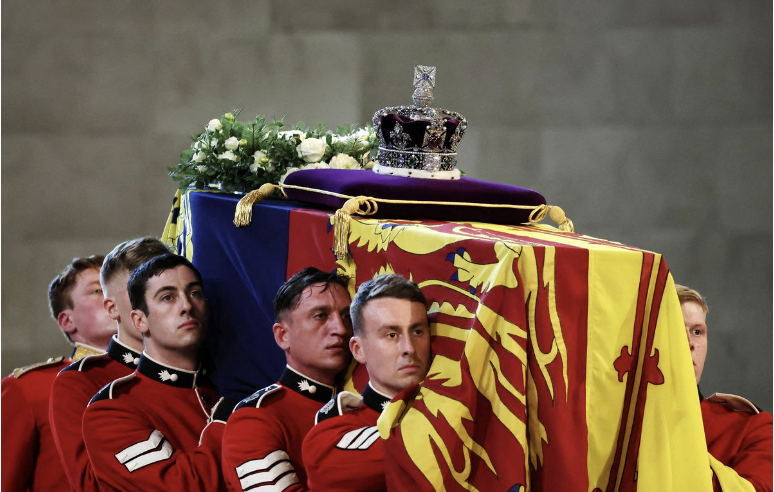A Remembrance with Contradictions
On September 8, 2022, Queen Elizabeth II died peacefully at the age of 96 in her Balmoral Castle estate in the Scottish Highlands. This shook the global community that such a stabilizing geopolitical force, reigning for over seventy years and becoming not only the longest reigning British monarch, but also the longest reigning female monarch, would die so suddenly.
The response to her unexpected death sent differing waves of response throughout the world from England’s new Prime Minister Liz Truss to those who were victims of the Queen’s colonization. Her death’s ripples reached across the pond to our Benjamin School, where a mixed response of grief, anger, and indifference is being felt. At the crux of these reactions remains the question: how will Queen Elizabeth II be remembered?
Recalling and understanding the Queen’s life as part of a historic and dutiful monarchy is easy for some. As is the case for science teacher Amanda Pierman. Having been born in England and living there until she was eleven years old until later returning for a period during University, she considers herself an “absolute royalist”.
Reflecting on the Queen’s life and her role, she believes that she “did a phenomenal job for an incredible length of time” and that “she was like the mum to our country; I feel very positively and strongly towards her.”
Contemplating her relationship with the Queen over the years, Pierman’s “understanding of her became deeper and more appreciative” towards her role as an “authoritative figure that help[ed] to control and rule and manage”. With the Queen’s death, Pierman remains grateful and devoted to the Queen’s life and impact, remembering her as a successful woman able to steady public whims.
Others, especially younger generations, do not feel the same connection towards the Queen that Pierman feels. For instance, Joshua Luiz, South-African born student, contemplates the Queen’s life in a self-proclaimed apathetic manner. He states he feels rather “indifferent” towards the Queen’s presence both in life and death, unable to remember any major impacts of her life on him.
On the other hand, college-counselor Anna Wright, a dual-citizen, who lived in England for over fifteen years and who had often experienced the Queen’s close-presence at parties, schools, and other events, remembers her similarly to Pierman.
Although she differs in that, “because I was born and raised as an American, I tended to see her as a normal person with an extraordinary life. I never felt a personal allegiance to her, but I was fond of her.” However, “after living in England, I came to understand the enormous pressure and sense of duty that the Queen […] felt.” She “devoted herself to a life of service to her country and those ideals.”
As well, she further “respects that the Queen has given her life to her people. […] It is extraordinary to think that she was working on behalf of her people up to the day of her death at the age of 96.” So, in general, Wright remains “sad that an extraordinary person had died. And with her, an era of time has ended. We will not see her again.” Thus acknowledging the Queen’s great responsibility towards the British people, Wright’s perception and memory grew her admiration towards the Queen.
However, some members of the Benjamin community hold strong positions against the Queen. For example, world language teacher Beverly Gustafson, who herself has lived in Europe for many years, continues to “have a hard time with the [effects of] colonialism [that] the Queen represents and her position most notably in India.”
Gustafson further emphasizes that reparations will play an “important piece” in reconciling with the past and holding England and Queen Elizabeth II accountable because of the amount of wealth that they accumulated “on the backs of people of Color”.
This stolen wealth, which she points to in the Queen’s crown jewels, is “serious damage that cannot be swept under the rug or shoved aside just because now the monarchy is so-called evolved.”
These harmful effects of the Queen are “difficult to reconcile with because there’s [a difference from] the image that is portrayed and what has actually happened”, so “there’s a part of me that realizes that it’s all wrong”.
So, Queen Elizabeth II’s existence and role “is very bittersweet for me, more bitter than sweet”. In general, Gustafson “[doesn’t] think […] the sins of the past can just be left to stay; I don’t think we can just get away with call[ing] it a historical moment,” for the effects, as seen with Barbados’ recent independence from the Queen’s Empire, are still alive.
Gustafson’s critical position and memory towards the Queen is not alone. Self-proclaimed Anglophile and world history teacher Anne Franzen, whose own godfather was the chief pastry baker for Queen Elizabeth II from 1960 to 1980, has felt “frustrated that the Queen was not able to end British policies of colonialism throughout the world”.
Franzen further recognizes today the cut-throat and “flawed” nature of the Queen’s existence as “someone who did whatever it took ‘to keep the firm running.’” Examples that she conjures with ease include “not allowing her sister to marry and her intrusions on the lives of Charles and Diana”.
Franzen expresses vexation at the public’s “misplaced nostalgia for ‘the way things were’” of which the Queen was indicative. Overall, she “would have preferred a monarch who used her influence for change instead of maintaining the status quo.” Franzen, believing in the importance of grasping an un-romanticized image of history, states she will continue to remember these darker moments of the Queen’s reign.
Thus, following Queen Elizabeth II’s death, the Benjamin community continues to remember her with very different opinions, expressing their own responses towards her life and death. This is a challenge that Benjamin will continue to face in looking back on the effects of her reign to this day.






